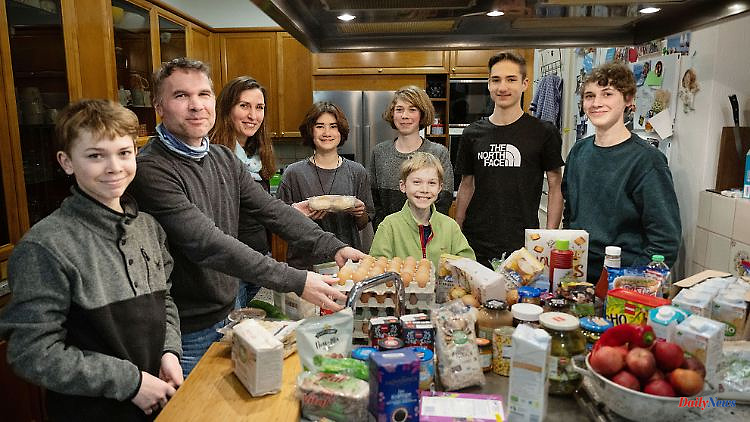In Germany, every eighth family has three or more children. Although these large families are viewed as the best performers in society, the children are at risk of poverty. The risk increases in parallel with rising food and energy prices. Even yoghurt can become a luxury.
Mother, father, six children - when they go shopping, the Nagel family's car is always full to the brim. In her XL household in Mülheim an der Ruhr in North Rhine-Westphalia, the fridge always wants to be refilled. Apples by the sack. Eggs by the pallet. Milk in cartons of ten. The dishwasher runs three times a day. Everyday life is well organized. This also applies to the Vockerath family with as many as nine children from Lehesten in Thuringia. And both families are juggling financially. The inflation that has persisted for months has hit households with many children disproportionately hard.
"Food has made the biggest jump in price," says 46-year-old Mario Nagel. In 2021, 1150 euros a month was enough for hygiene items and food, in 2022 the family needed 1400 to 1500 euros for this. She also buys on sale and then sometimes in stock, also on the farm. The prices there have not climbed quite as much. "Good nutrition is very important to us, so we'd rather turn the heating down even further." The Nagels, with one daughter and five sons between the ages of 10 and 16, do not go without fruit, vegetables and some organic products.
Mario Nagel works for a state authority, Marion Nagel is a primary school teacher. "It's still doing relatively well with our two full-time incomes. But we're noticing that everything is getting more expensive," says the family man. The school where Marion Nagel works is in a socially disadvantaged area. There she notes: "The children no longer have any fruit and vegetables with them. The families have no money for them. And many are no longer able to do activities together," says the 44-year-old. "That's serious, that's poverty. At least for healthy food, the prices urgently need to be reduced, for example via VAT."
The oldest, 16-year-old son Lars is content with 17 to 18 degrees in the room. "I used to be one of those experts who sometimes left the window open while the heating was on. Now we're all saving energy." Overall, the temperature in the house has been reduced by two degrees. The washing machine also runs at a lower temperature. The dryer is turned on less often, reports Marion Nagel. The enormously increased fuel costs do not burden the family so much, because everyone in the metropolitan area travels by bus, train and bicycle whenever possible.
In the countryside, on the other hand, almost nothing works without a car. The Vockeroth family, who lives in the countryside near the Bavarian border, are hurt by the high fuel costs, as roofer and master carpenter David Vockeroth explains. A VW bus, which his wife Nicole drives, and a Crafter, which he steers with a bus driver's license, are in action. "Last summer I still thought we were fine, we could even afford regular vacations. But since the dramatic price development, we've had to grit our teeth." His 45-year-old wife is a police officer, and the 54-year-old is a self-employed entrepreneur. So far, the two salaries have just been enough. Now it's really tight for the Vockeroths - three girls, six boys between the ages of two and 22.
When shopping thrifty for a week, they used to get by with 120 to 150 euros for the bare necessities. "Now we are well over 200 euros." Even staple foods can currently become a luxury: "We still have yoghurt when it's on offer," regrets Vockeroth. The prices for music schools have been raised. However, the parents would like to make it possible for their children to continue in some way. "It's really a big challenge to make ends meet now."
Calculation example: If an income of 1000 euros is divided between four people, the result is 250 euros per capita, so price increases can still be absorbed to some extent. But if the 1000 euros have to be enough for eleven people, there is no room for savings at 90 euros per person. A child needs up to 1,000 euros a month for a secure existence and a solid upbringing, says Vockeroth. "It should be worth it to the state and society." Daycare centers would have to become free, and parental allowance during parental leave would have to rise sharply. More recognition is needed because: "We families with multiple children ensure the survival of society."
The Nagel family criticizes the entrance fees for zoos, theaters and amusement parks. "So-called family tickets are usually for two adults and one or two children," says Mario Nagel. "You often think about going there." The eight have been vacationing on the farm for years or they go hiking - not expensive. Marion Nagel emphasizes: "It's great fun having a lot of children. It's a shame that so many say they don't want children." Without children there will no longer be any benefits from the social systems - health insurance or pensions. The couple would find it fair to take this into account in current calculations, for example with a retirement age staggered according to the number of children.
The fact is: in addition to children in single-parent families, boys and girls in multi-child families in Germany are particularly at risk of poverty. Studies show this again and again. The NRW state association knows that many parents with several children also come to the food banks. Families with large children are the top performers of society and make a significant contribution to the fact that the intergenerational contract of the social security systems organized in solidarity works, as the Association of Large Families Germany (VKFD) also emphasizes. There are around 1.3 million multi-child families nationwide - families with three or more children. That corresponds to about every eighth family. Politicians must do more for them, warns VKFD boss Elisabeth Müller.
XL families are often confronted with prejudice, adds spokeswoman Laura Schlichting. "Sometimes it is said that they are privileged, wealthy, afford nannies for their children." The other cliché is "problem families". Both miss reality. "In fact, large families come from the middle of society and they need much more visibility and support - socially and politically."












